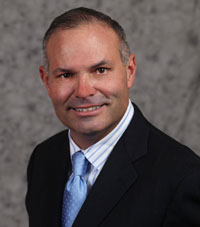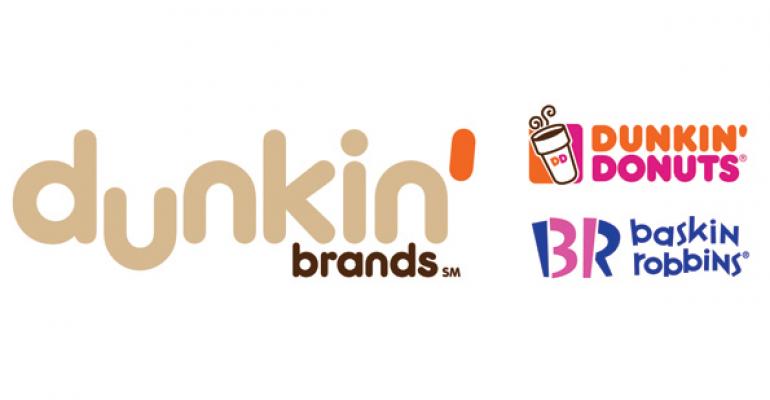Dunkin’ Brands Group Inc. has retooled three top executive positions between its Dunkin’ Donuts and Baskin-Robbins brands as part of an ongoing succession plan designed to improve execution in the U.S. and regain momentum internationally, the company said Thursday.
Bill Mitchell has been named president, Dunkin’ Brands International, consolidating the leadership of nearly 8,500 Dunkin’ Donuts locations and Baskin-Robbins units in 61 countries outside the U.S. under one executive. Mitchell joined the company in 2010, and previously led the Baskin-Robbins chain in the U.S., Canada and Japan, as well as both brands in China and Korea.
Scott Murphy, Dunkin’ Brands chief supply officer and a 10-year board member on the doughnut chain’s purchasing and distribution cooperative, has been named senior vice president, Dunkin’ Donuts operations U.S. and Canada. Although he will remain as chief supply officer, his previous responsibility for the two brands in Europe and Latin America now fall under Mitchell.
Murphy replaces Weldon Spangler, previously vice president, Dunkin’ Donuts operations in the U.S. and Canada, who has been promoted to senior vice president, Baskin-Robbins U.S. and Canada. Spangler replaces Mitchell in that role.

The appointments were announced as Canton, Mass.-based Dunkin’ Brands Group reported mixed results for its third quarter ended Sept. 26.
As previously disclosed during an analyst day meeting, same-store sales for Dunkin’ Donuts U.S. locations rose 1.1 percent for the quarter, driven largely by increases in average ticket, with strong beverage, sandwich and doughnut sales, but declines in K-Cup sales.
Traffic declined by 0.7 percent during the quarter.
Baskin-Robbins domestic units reported a same-store sales increase of 7.5 percent, driven primarily by traffic increases, with strong growth in online cake sales.
The management changes were designed in part to address the company’s challenges, said Nigel Travis, Dunkin' Brands chairman and CEO, describing Mitchell as “a turnaround expert” who revived the Baskin-Robbins brand domestically, and “the best battler in the operational ranks.” Mitchell will report directly to Travis.
Murphy, who will take responsibility for more than 8,000 Dunkin’ Donuts units in the U.S. and Canada, will report to Paul Twohig, president of Dunkin’ Donuts U.S. and Canada.
Together, the two executives will work to “win the hearts and minds of franchisees,” which is key in a return to positive transaction growth, Travis said.
Travis said Murphy has excellent relations with franchisees, and will focus on improving speed of service and execution as the company looks to double its domestic footprint and improve unit economics.
While third-quarter results disappointed company officials, Travis said the company is on track to hit full-year same-store sales projections of a 1-percent to 3-percent increase in same-store sales for Dunkin’ Donuts U.S.
The company also upgraded its guidance for Baskin-Robbins U.S., projecting a same-store sales increase of 3 percent to 5 percent for the year, an increase from earlier guidance of 1 percent to 3 percent growth.
Net income fell 15.5 percent during the quarter, to $46.2 million, or 48 cents per share, compared with $54.7 million, or 52 cents per share, in part as a result of increases in interest expense following a refinancing in January.
Revenue increased 8.9 percent, to $209.8 million.
“Our overall financial performance in the third quarter, including the strong growth in our revenue, operating income and adjusted earnings per share, demonstrates the benefits and resiliency of our asset-light franchise business model, and the solid Dunkin’ Donuts U.S. net restaurant growth shows the continued demand for the brand,” Travis said. “While we were disappointed with our third-quarter Dunkin’ Donuts U.S. comparable-store sales, we remain on track to deliver our full-year targets, and we are working closely with our franchisees to regain transaction momentum through great products, exceptional guest service and innovative marketing.”
The company’s plans to build its digital ecosystem will also help boost future performance, Travis said.
More than 15 million users have downloaded the Dunkin’ Donuts mobile app, and the DD Perks loyalty club has grown to 3.6 million members.
Expanding mobile tests, more
The company is expanding its test of mobile ordering and payment, and soon will begin testing delivery, he said.
Although the company gave no insight into the current quarter’s trends, Travis said Dunkin’ Donuts has seen no impact from McDonald’s launch of all-day breakfast earlier this month.
“We think it could actually net benefit us because it will focus everyone on the fact that we have a menu that we serve all day. We serve it very effectively all day. We operate it well all day, and our crew is used to serving it all day,” he said. “If I had to assess whether it is a good or bad thing that they’re doing an all-day breakfast, I would say it’s a good thing for Dunkin’ Donuts.”
The company saw the addition of 68 net new Dunkin’ Donuts units across the U.S., despite the closure of 31 self-service units inside Speedway gas stations. The company said about 100 Speedway units were expected to close by next year as a result of the acquisition of the gas stations, but the locations are low-performing and their closure is not expected to have a significant impact on results.
Internationally, both brands continued to be impacted by the MERS virus outbreak in Korea, and Baskin-Robbins continued to struggle in Japan, Travis said.
Dunkin’ Brands reported a same-store sales increase of 0.8 percent for Dunkin’ Donuts International, but Baskin-Robbins locations overseas reported a 2.4-percent decline in same-store sales.
Within five years, Dunkin’ Brands expects to grow from 19,100 units — including 11,500 Dunkin’ Donuts locations and 7,600 Baskin-Robbins units — to more than 30,000 globally, Travis said.
“There are very few brands out there with that kind of opportunity,” he said.
Contact Lisa Jennings at [email protected].
Follow her on Twitter: @livetodineout

